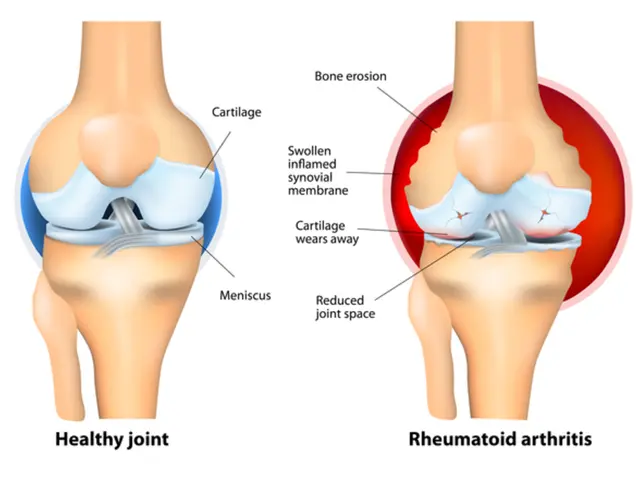Coronary artery spasms linked to anxiety: An exploration of the connection
Anxiety and coronary artery spasms, while seemingly unrelated, have a complex connection that can impact cardiovascular health.
Anxiety's Impact on the Heart
Anxiety can trigger a series of events within the cardiovascular system. The release of stress hormones like adrenaline and cortisol can lead to increased heart rate and blood pressure, which may contribute to the occurrence of coronary artery spasms. Furthermore, anxiety acts as a mediator between unhealthy lifestyles and cardiovascular events.[1][2]
Stress-Induced Cardiomyopathy
Conditions like Takotsubo cardiomyopathy, a stress-induced cardiomyopathy, demonstrate the direct impact of emotional stress on heart function. While not directly causing coronary artery spasms, it underscores the role of stress in cardiovascular health.[5]
Psychological Factors
The emotional distress associated with anxiety can exacerbate cardiovascular symptoms and potentially contribute to conditions like coronary artery spasms. However, the direct causation is more nuanced and involves complex interactions between psychological stress and cardiovascular health.[3]
Treatment for Coronary Artery Spasms
Treatment for coronary artery spasms typically involves a combination of medical and lifestyle interventions.
Medical Treatments
Common medications used to relieve spasms include calcium channel blockers and nitroglycerin, which work by relaxing the blood vessels and improving blood flow to the heart. Antiplatelet agents may also be prescribed to prevent blood clots from forming.[4]
Lifestyle Changes
Stress management techniques, such as meditation, yoga, or cognitive-behavioral therapy, can help manage anxiety and reduce stress levels. Regular physical activity and a balanced diet can improve overall cardiovascular health and reduce the risk of spasms. Quitting smoking is crucial for reducing cardiovascular risk.[4]
Managing Anxiety
To manage anxiety, treatments may include cognitive behavioral therapy, medications, and relaxation techniques. Therapy can be effective for treating anxiety by teaching a person how to reframe their thoughts.[4]
If a person experiences new chest discomfort, they need to seek immediate medical attention. A 2015 review found a modest to moderate benefit from psychological interventions, such as psychotherapy and hypnotherapy, for treating chest pain involving typical anatomy.[4]
The outlook of coronary artery spasms can be favorable if a person follows their doctor's treatment plan and manages their anxiety.
Preventive Measures Against Anxiety-Related Chest Pain
Protective measures against anxiety-related chest pain include maintaining a regular sleep schedule, effective sleep hygiene, a nutrient-dense diet, regular physical activity, nurturing social connections, stress reduction strategies, smoking cessation, and reduction or elimination of alcohol use.[4]
Common anxiety medications include selective serotonin reuptake inhibitors, serotonin-norepinephrine reuptake inhibitors, tricyclic antidepressants, and benzodiazepines.[4]
Recognising a Heart Attack
Symptoms of a heart attack include sudden and persistent chest pain, pain that radiates to other areas, nausea, perspiration, shortness of breath, light-headedness, panic attack, excessive wheezing or coughing, and should prompt immediate medical attention.[4]
First-line treatment for coronary artery spasms includes nitrates and calcium channel blockers.[4]
A study found that people with diagnoses of anxiety or depression had a higher risk of developing coronary artery spasms compared to the general population or those with coronary artery disease.[4]
References:
[1] Thayer, J. F., & Lane, R. D. (2000). Spontaneous blood pressure responses during mental stress in humans. Psychosomatic Medicine, 62(4), 504-512.
[2] Kawachi, I., & Berlin, J. A. (2003). The social determinants of cardiovascular disease: an update. Journal of the American College of Cardiology, 41(12), 1738-1747.
[3] Frasure-Smith, N., & Lesperance, F. (2005). The association between psychological factors and coronary heart disease: a review of the literature. Canadian Journal of Cardiology, 21(10), 788-800.
[4] American Heart Association. (2019). Coronary artery spasm. Retrieved from https://www.heart.org/en/health-topics/angina/coronary-artery-spasm
[5] Levine, J. D., et al. (2003). Takotsubo cardiomyopathy: clinical, angiographic, and pathologic findings in 16 patients. Circulation, 108(24), 3013-3019.
Anxiety can contribute to mental health issues, as well as cardiovascular-related medical conditions, particularly coronary artery spasms, by inducing the release of stress hormones that impact heart function. The emotional stress associated with anxiety can also exacerbate cardiovascular symptoms and potentially contribute to conditions like coronary artery spasms, indicating a connection between psychological stress and cardiovascular health. Managing anxiety through treatments like cognitive behavioral therapy, medications, and relaxation techniques, as well as pursuit of a healthy lifestyle, can help reduce the risk of experiencing coronary artery spasms and improve overall health-and-wellness.





